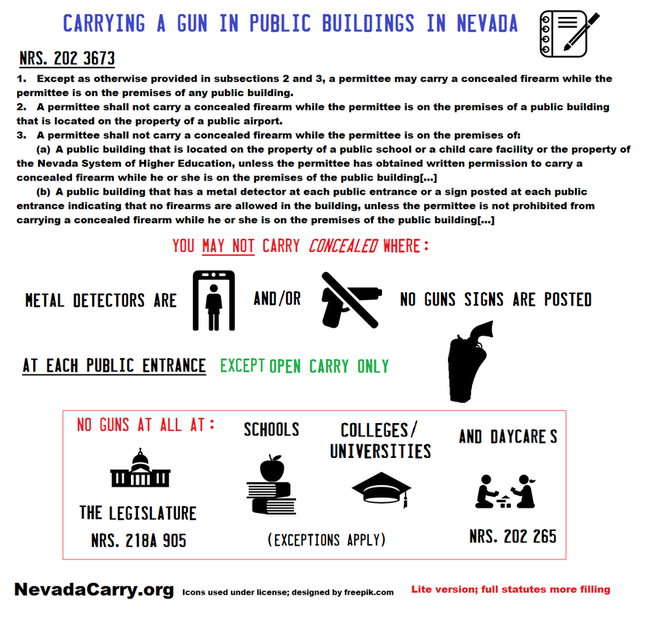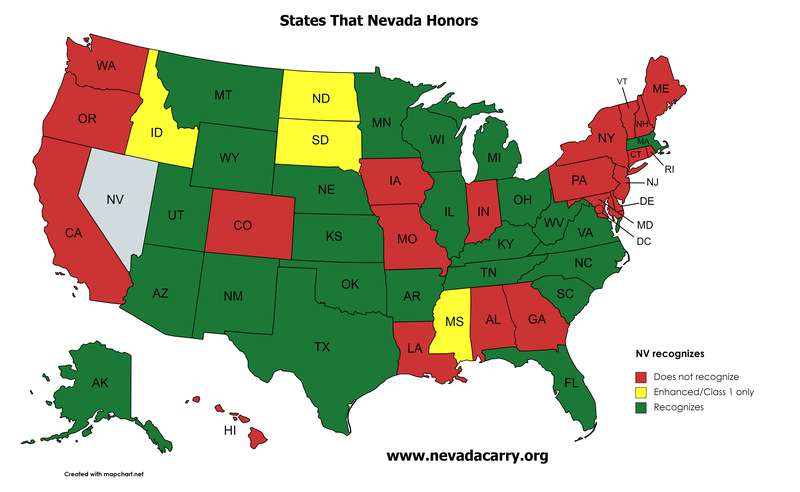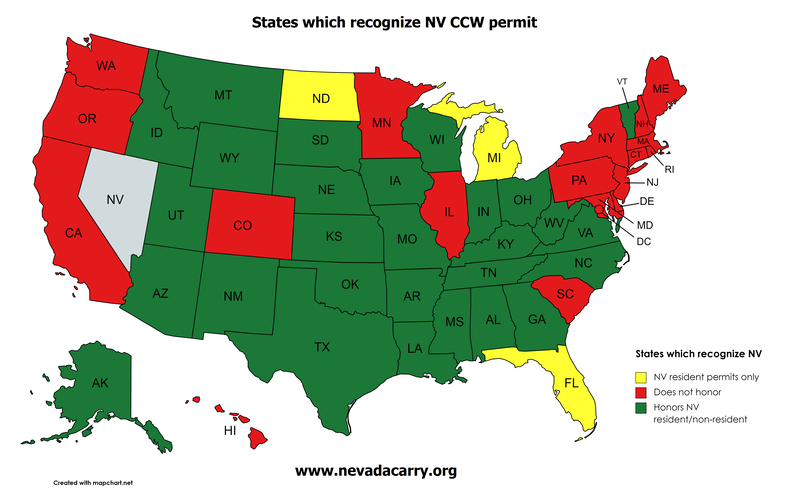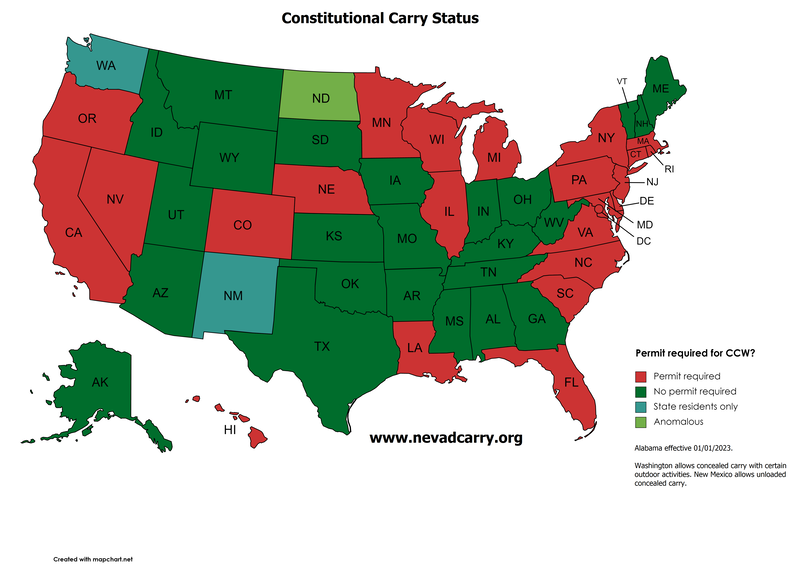
“Concealed firearm” is a loaded or unloaded handgun which is carried upon a person in such a manner as not to be discernible by ordinary observation (NRS 202.3653), this includes in a carried bag/purse.
Concealing a firearm without a permit is a felony. Nevada is not a constitutional carry state.
Concealing a firearm without a permit is a felony. Nevada is not a constitutional carry state.
"Printing," where the imprint of your gun shows through your clothing, is not illegal anywhere in the United States.

Expired Permits
If your permit has expired, you may not carry concealed until your renewal permit is issued. There is renewal no "grace period." The blanket 90 day extension for expiring permits to July 15th has passed; your permit may be extended 90 days depending on the issuance/processing status of the issuing sheriff's office.
If your permit has expired, you may not carry concealed until your renewal permit is issued. There is renewal no "grace period." The blanket 90 day extension for expiring permits to July 15th has passed; your permit may be extended 90 days depending on the issuance/processing status of the issuing sheriff's office.

You must carry your permit and proper ID (such as a driver license) when carrying a concealed firearm. Both the permit and proper identification must be presented if asked by a peace officer (no duty to first inform). A violation is an infraction punishable by a $25 fine (NRS 202.3667). Note that this does not require you to carry your concealed firearm permit when carrying openly. Nevada does not require you to notify a peace officer that you are carrying a firearm, but out of courtesy, if you are being detained, you may choose to inform the officer you are lawfully carrying a concealed firearm. Gun owner's guide to rights during police encounters.
Can police take my gun for officer safety if I get pulled over or detained?
Police may detain you if the officer encounters you under circumstances which reasonably indicate that you have committed, are committing or are about to commit a crime (NRS 171.123), or else he must release you if no probable cause for arrest appears after inquiry into the circumstances which prompted the detention. NRS 171.1231
A police officer who has legally detained you (reasonably suspects) reasonably believes that you are armed with a dangerous weapon and is a threat to the safety of the officer or another, the officer may search such you to the extent reasonably necessary to ascertain the presence of such weapon. If the search discloses a weapon or any evidence of a crime, such weapon or evidence may be seized (NRS 171.1232). It is assumed they have to give your weapon back if they release you for lack of probable cause and they have no probable cause that the weapon is stolen.
Can police take my gun for officer safety if I get pulled over or detained?
Police may detain you if the officer encounters you under circumstances which reasonably indicate that you have committed, are committing or are about to commit a crime (NRS 171.123), or else he must release you if no probable cause for arrest appears after inquiry into the circumstances which prompted the detention. NRS 171.1231
A police officer who has legally detained you (reasonably suspects) reasonably believes that you are armed with a dangerous weapon and is a threat to the safety of the officer or another, the officer may search such you to the extent reasonably necessary to ascertain the presence of such weapon. If the search discloses a weapon or any evidence of a crime, such weapon or evidence may be seized (NRS 171.1232). It is assumed they have to give your weapon back if they release you for lack of probable cause and they have no probable cause that the weapon is stolen.
Guns Carried
For permits issued on or after July 1, 2011, any owned handgun, semi-automatic pistol or revolver, can be carried concealed by a permittee. If the permit was issued before July 1, 2011, the permit will list the specific authorized handguns that can be legally carried. There is no legal opinion whether that requirement for pre 7/1/2011 permittees would still have legal force or is actively being enforced. All 'listed weapons' permits will expire on July 1, 2016 and licensee's renewals will cover any handgun the permittee owns.
For permits issued on or after July 1, 2011, any owned handgun, semi-automatic pistol or revolver, can be carried concealed by a permittee. If the permit was issued before July 1, 2011, the permit will list the specific authorized handguns that can be legally carried. There is no legal opinion whether that requirement for pre 7/1/2011 permittees would still have legal force or is actively being enforced. All 'listed weapons' permits will expire on July 1, 2016 and licensee's renewals will cover any handgun the permittee owns.

Only handguns (pistols and revolvers) may be carried concealed. It is a felony to carry any weapon other than a handgun (with a permit) concealed, including a rifle, shotgun, or other weapon. This would include short shotgun-type weapons and short-barreled rifles/shotguns. Permits only cover handguns. Generally, carrying an unloaded long gun in a case to/from the range, gun shop, or other legitimate firearm business is not an issue. Nevada law enforcement is expected to use discretion and common sense.
"1. Except as otherwise provided in this section and NRS 202.3653 to 202.369, inclusive, a person within this State shall not:
(d) Carry concealed upon his or her person any:
(3) Pistol, revolver or other firearm, other dangerous or deadly weapon or pneumatic gun." (NRS 202.350)
"1. Except as otherwise provided in this section and NRS 202.3653 to 202.369, inclusive, a person within this State shall not:
(d) Carry concealed upon his or her person any:
(3) Pistol, revolver or other firearm, other dangerous or deadly weapon or pneumatic gun." (NRS 202.350)
A handgun is defined by the NRS to be a firearm which has a short stock and is designed to be held and fired by the use of a single hand, citing 18 U.S.C. § 921(a)(29). Whether AR-style pistols are considered pistols has not been officially been decided by the state, the explicit reference to the federal definition would indicate they are indeed considered handguns.
Is insurance required in Nevada to carry (or own) a gun?
No. Insurance is not required in Nevada to own or a carry a gun. CCW or self-defense insurance is a good idea to help with a legal defense in case of a defensive gun use, but a no insurance is required.
No. Insurance is not required in Nevada to own or a carry a gun. CCW or self-defense insurance is a good idea to help with a legal defense in case of a defensive gun use, but a no insurance is required.
Background Check Exemption
Most Nevada permittees qualify for an exemption from the requirement to undergo the background check (as they've already been vetted) when buying a firearm from a dealer and paying the $25 fee. The Form 4473 is still completed and a copy of the permit is needed for the dealer's records.
For permits issued on or after July 1, 2011, the permittee would be exempt from the Brady Bill background check when buying from a licensed dealer. Permits issued before this would be invalid because the ATF decertified the state after it was revealed some sheriffs were not complying with certain renewal requirements required to qualify for the exemption. This would not qualify to avoid the duty to obtain a private-sale background check if the universal background check initiative passes in 2016 or if those background checks would still be free.
Most Nevada permittees qualify for an exemption from the requirement to undergo the background check (as they've already been vetted) when buying a firearm from a dealer and paying the $25 fee. The Form 4473 is still completed and a copy of the permit is needed for the dealer's records.
For permits issued on or after July 1, 2011, the permittee would be exempt from the Brady Bill background check when buying from a licensed dealer. Permits issued before this would be invalid because the ATF decertified the state after it was revealed some sheriffs were not complying with certain renewal requirements required to qualify for the exemption. This would not qualify to avoid the duty to obtain a private-sale background check if the universal background check initiative passes in 2016 or if those background checks would still be free.
Where is concealed carry illegal?
Federally prohibited places

No guns signs
Signs do not have the force of law on private property. In public buildings, only concealed carry is banned where 'no guns' signs are posted or metal detectors are present at each public entrance (NRS 202.3673), except federal government buildings where all carry is banned.
Signs do not have the force of law on private property. In public buildings, only concealed carry is banned where 'no guns' signs are posted or metal detectors are present at each public entrance (NRS 202.3673), except federal government buildings where all carry is banned.
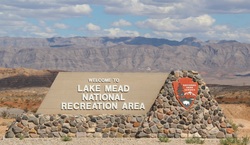
Firearms, loaded or unloaded, concealed or openly carried, are prohibited in the following places:
National Parks
Section 512, Credit CARD Act of 2009 (and 54 USC § 104906) changed federal law to make park firearm regulations reflect state law. Typically, the only restrictions on firearm carry are state and local laws. If it is legal elsewhere in the state, it is legal in the park and sections that conflict with state law regarding carrying and possessing firearms (but not shooting bans) do not apply. So though on National Park Service lands (National Parks, Monuments, etc.) carrying a firearm or possessing loaded firearms are prohibited in vehicles (unless one has a special park permit, usually for hunting), this does not apply if the state allows open and/or concealed carry, or loaded/unloaded firearms in vehicles.
The park buildings (visitor centers, offices, etc.) are still federal facilities and off-limits to firearms. Discharge of firearms, except when lawfully hunting, is generally prohibited. Discharge of firearms, except when lawfully hunting, is generally prohibited. The same applies for National Wildlife Refuges, 16 USC § 1a–7b.
- Inside federal facilities (including courthouses and offices like a Social Security office) 18 U.S. Code § 930;
- On military bases (military personnel should refer to DoD policy and post orders);
- Post Office property (includes the parking lot), but not post-office windows in stores (contract stations), 39 CFR 232.1(l);
- VA hospitals/facilities including federal veterans' cemeteries (carrying) 38 CFR 1.218 (13).
National Parks
Section 512, Credit CARD Act of 2009 (and 54 USC § 104906) changed federal law to make park firearm regulations reflect state law. Typically, the only restrictions on firearm carry are state and local laws. If it is legal elsewhere in the state, it is legal in the park and sections that conflict with state law regarding carrying and possessing firearms (but not shooting bans) do not apply. So though on National Park Service lands (National Parks, Monuments, etc.) carrying a firearm or possessing loaded firearms are prohibited in vehicles (unless one has a special park permit, usually for hunting), this does not apply if the state allows open and/or concealed carry, or loaded/unloaded firearms in vehicles.
The park buildings (visitor centers, offices, etc.) are still federal facilities and off-limits to firearms. Discharge of firearms, except when lawfully hunting, is generally prohibited. Discharge of firearms, except when lawfully hunting, is generally prohibited. The same applies for National Wildlife Refuges, 16 USC § 1a–7b.
Red Rock National Conservation Area is an exception and does not allow loaded firearms (no magazine/clip inserted, no rounds attached to the weapon or in the chamber). It is not a part of the National Park System and is managed by the Bureau of Land Management. See the supplemental rules section regarding weapons only here. More at the blog. Shooting on Bureau of Land Management land is permitted in most other areas, subject to local restrictions and county/city ordinances (BLM Recreational Shooting page). National Forest lands in Nevada have no ban on the carry of firearms.
Interstate Transportation Protection 18 USC § 926A
This section was intended to protect innocent passage of travelers who might have a firearm prohibited by local jurisdiction. For instance, a resident of a frontier state driving through California with an 'assault weapon' to another free state. The trip must be from one free state to another, the firearm unloaded, and neither the firearm nor any ammunition is readily accessible from the passenger compartment. In the case of a vehicle without a compartment separate from the driver’s compartment the firearm or ammunition shall be contained in a locked container other than the glove compartment or console.
Airports/Aircraft 49 CFR 1540.111 and 49 USC § 46505
Under federal law (local laws may differ), firearms are prohibited beyond the TSA checkpoints. You also cannot attempt to enter a TSA checkpoint while armed, even by mistake. Check your bags! Even loose ammunition, empty magazines, spent cases, and miscellaneous gun parts have caused problems and prosecutions for travelers. Learn more about the TSA regulations.
Military Bases
Self-defense firearms are generally prohibited on base. New DoD guidelines have been published, but implementation is unknown. Almost uniformly, civilians may not possess firearms on base. Service-members may be required to store their weapons as their commanding officer directs. Check individual base and service branch regulations.
Hoover Dam prohibits firearms. More information at the Hoover Dam Police page. 43 CFR 423.30
Indian Reservations
Firearm carry on Indian reservations is a gray area. Some reservations in Nevada do permit concealed carry with a valid concealed firearm permit, however, it may vary. Tribes cannot enforce tribal law on non-tribal members, though they can enforce state and federal law. You may be trespassed from the reservation and have your firearm confiscated. One should contact individual reservation authorities for clarification of their regulations.
Interstate Transportation Protection 18 USC § 926A
This section was intended to protect innocent passage of travelers who might have a firearm prohibited by local jurisdiction. For instance, a resident of a frontier state driving through California with an 'assault weapon' to another free state. The trip must be from one free state to another, the firearm unloaded, and neither the firearm nor any ammunition is readily accessible from the passenger compartment. In the case of a vehicle without a compartment separate from the driver’s compartment the firearm or ammunition shall be contained in a locked container other than the glove compartment or console.
Airports/Aircraft 49 CFR 1540.111 and 49 USC § 46505
Under federal law (local laws may differ), firearms are prohibited beyond the TSA checkpoints. You also cannot attempt to enter a TSA checkpoint while armed, even by mistake. Check your bags! Even loose ammunition, empty magazines, spent cases, and miscellaneous gun parts have caused problems and prosecutions for travelers. Learn more about the TSA regulations.
Military Bases
Self-defense firearms are generally prohibited on base. New DoD guidelines have been published, but implementation is unknown. Almost uniformly, civilians may not possess firearms on base. Service-members may be required to store their weapons as their commanding officer directs. Check individual base and service branch regulations.
Hoover Dam prohibits firearms. More information at the Hoover Dam Police page. 43 CFR 423.30
Indian Reservations
Firearm carry on Indian reservations is a gray area. Some reservations in Nevada do permit concealed carry with a valid concealed firearm permit, however, it may vary. Tribes cannot enforce tribal law on non-tribal members, though they can enforce state and federal law. You may be trespassed from the reservation and have your firearm confiscated. One should contact individual reservation authorities for clarification of their regulations.
State prohibited places

. All firearms are prohibited in the following places:
- On the premises of a public or private school, on the property of the Nevada System of Higher Education, or a child care facility without written permission of the college president, school principal, or head of a public child care facility, including in the parking lot (NRS 202.265).
- A private in-home child care facility, except by the homeowner(s) or residents. [Ibid.]
- The legislative building or wherever the legislature is conducting business (NRS 218A.905).
- The secure area of an airport (for instance, employee-only areas or past the TSA checkpoints).
- Inside a building of a public airport (open carry is legal outside of the secure area).
- Inside a public building (government building) with either 'no guns' signs or metal detectors at each public entrance (open carry may be legal). See below for more details.
Schools and Colleges/Universities

It is illegal to have a firearm (including openly carried) on school/college/university/child care facility property without written permission. There is no parking lot exemption in Nevada. Principals, college/university presidents, or the "designated person" of a child care facility can grant permission. No public school district in Nevada has an open policy of arming teachers or allowing parents to be armed on campus. College/university campus carry is extremely difficult to get and requires essentially an active, specific threat for issue. There is no state-level gun free zone off-campus.
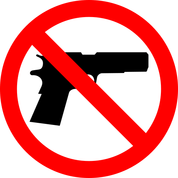
Why Child Care Facilities?
This includes in-home daycare, day and overnight camps, and daycare business per NRS 432A.024. A daycare within a business, such as casino would be off-limits, but not the larger business housing the daycare.. Unfortunately, an unprofessional group of bounty hunters attempted to arrest a wanted person and believed that she was at a children's day care. The incident was disturbing to the children and to the owner. The owner then contacted Assemblywoman Smith who, in 2007, successfully had the law amended to prohibit firearms in child care facilities. Click here for the citation from the legislative minutes.
To see what is and isn't a licensed child care facility, visit this DPBH webpage and look for the current list under the 'Resources' right-hand sidebar and click 'Providers.'
Local and State Public Buildings
NRS 202.3673 prohibits concealed carry (not open carry) in public buildings where there are 'no firearm' signs or metal detectors at each public entrance. Signage at public buildings generally does not refer to open carry as the intent is to improperly discourage anyone from carrying at all, openly or not. Exceptions: a judge at their courthouse, a prosecuting attorney employed at the public building, an employee of the public building while he or she is on the premises of the public building where they work, any other permittee who has written permission of a person authorized to grant that permission. Public buildings are government buildings, not businesses and private property merely open to the public.
This includes in-home daycare, day and overnight camps, and daycare business per NRS 432A.024. A daycare within a business, such as casino would be off-limits, but not the larger business housing the daycare.. Unfortunately, an unprofessional group of bounty hunters attempted to arrest a wanted person and believed that she was at a children's day care. The incident was disturbing to the children and to the owner. The owner then contacted Assemblywoman Smith who, in 2007, successfully had the law amended to prohibit firearms in child care facilities. Click here for the citation from the legislative minutes.
To see what is and isn't a licensed child care facility, visit this DPBH webpage and look for the current list under the 'Resources' right-hand sidebar and click 'Providers.'
Local and State Public Buildings
NRS 202.3673 prohibits concealed carry (not open carry) in public buildings where there are 'no firearm' signs or metal detectors at each public entrance. Signage at public buildings generally does not refer to open carry as the intent is to improperly discourage anyone from carrying at all, openly or not. Exceptions: a judge at their courthouse, a prosecuting attorney employed at the public building, an employee of the public building while he or she is on the premises of the public building where they work, any other permittee who has written permission of a person authorized to grant that permission. Public buildings are government buildings, not businesses and private property merely open to the public.
The Legislative Counsel (the state legislature's attorney) found in this opinion that open carry is permissible in public areas of public buildings. Concealed carry is legally restricted in more locations than open carry is.
Two Important Exceptions
Per NRS 202.3673(4)(c) Permittees who are employees of a public building may carry a concealed firearm in that posted building, however, NRS 244.364 (counties), NRS 268.418 (cities), and NRS 269.222 (towns), the state preemption laws, allow local authorities to make their own policies regarding firearms. So while a permittee may carry legally inside the building, they can be disciplined or fired if they carry in violation of their employer's ban on carrying firearms.
If the permittee has received written permission from the person in control of the public building to carry a concealed firearm, they may do so, but permission is rarely granted. Employees in a public building (except a school) can carry concealed, but are not exempted from their employer's policies which may ban firearms.
Two Important Exceptions
Per NRS 202.3673(4)(c) Permittees who are employees of a public building may carry a concealed firearm in that posted building, however, NRS 244.364 (counties), NRS 268.418 (cities), and NRS 269.222 (towns), the state preemption laws, allow local authorities to make their own policies regarding firearms. So while a permittee may carry legally inside the building, they can be disciplined or fired if they carry in violation of their employer's ban on carrying firearms.
If the permittee has received written permission from the person in control of the public building to carry a concealed firearm, they may do so, but permission is rarely granted. Employees in a public building (except a school) can carry concealed, but are not exempted from their employer's policies which may ban firearms.
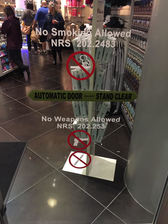 This sign lists the section that defines "firearm."
This sign lists the section that defines "firearm."
"Public" means a government building (owned by cities, the state, counties, local districts, etc.). This does not mean private property open to the public, like casinos, stores, and other businesses.
Private Property
Yes, legally you can carry on private property (except private schools and daycares) even if there is a 'no guns' sign. The NRS citation on signs are for non-applicable sections, are nonsense, or just the trespassing law. However, most indoor malls and casinos will ask you to disarm or leave the property if you are discovered. All they can do is ask you to disarm or tell you to leave. Failure to do so would be a trespassing violation. Private property owners have the right to choose to allow or prohibit firearms. State preemption does not apply on private property, which includes HOA property. See below for a partial list of known anti-gun locations.
Private Property
Yes, legally you can carry on private property (except private schools and daycares) even if there is a 'no guns' sign. The NRS citation on signs are for non-applicable sections, are nonsense, or just the trespassing law. However, most indoor malls and casinos will ask you to disarm or leave the property if you are discovered. All they can do is ask you to disarm or tell you to leave. Failure to do so would be a trespassing violation. Private property owners have the right to choose to allow or prohibit firearms. State preemption does not apply on private property, which includes HOA property. See below for a partial list of known anti-gun locations.
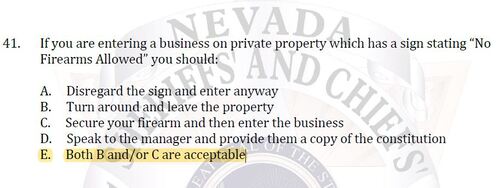
Note that the "CCW test" required by the state and published by the Nevada Sheriffs' and Chiefs' Association, implies that carrying past a "no guns" sign on private property is not proper. It implies that one should disarm or go elsewhere. This is not a legally correct answer. One can carry past the sign, but for trespassing charges to apply, the person then has to be discovered to be armed and asked to leave the premises. While (E) is the correct answer on the test, this does not comport with how the trespassing statute is applied. In reality, (A) is perfectly valid for private property.
Can I carry concealed on private property or in my home?
No. Concealed carry without a permit is illegal everywhere in the state. While it is unlikely you will be arrested for carrying a concealed firearm without a permit on your own private property, it is not legal. See NRS 202.350 1.(d)
Do I have to obey ‘no guns’ signs on private property?
No, signs do not have the force of law in Nevada on private property. If the owner or management wants you to leave or disarm, you must comply or you can be arrested for trespassing. Making sure that the owner or corporate management knows they lost your business for denying you the right to lawfully carry is a good course of action. The majority of Nevada businesses are firearm friendly.
Can I carry concealed at the mall? Can I carry concealed at a casino?
Yes, legally you can carry on private property (except private schools and daycares) even if there is a 'no guns' sign. However, most indoor malls and casinos will ask you to disarm or leave the property if you are discovered. All they can do is ask you to disarm or tell you to leave. Failure to do so would be a trespassing violation.
No. Concealed carry without a permit is illegal everywhere in the state. While it is unlikely you will be arrested for carrying a concealed firearm without a permit on your own private property, it is not legal. See NRS 202.350 1.(d)
Do I have to obey ‘no guns’ signs on private property?
No, signs do not have the force of law in Nevada on private property. If the owner or management wants you to leave or disarm, you must comply or you can be arrested for trespassing. Making sure that the owner or corporate management knows they lost your business for denying you the right to lawfully carry is a good course of action. The majority of Nevada businesses are firearm friendly.
Can I carry concealed at the mall? Can I carry concealed at a casino?
Yes, legally you can carry on private property (except private schools and daycares) even if there is a 'no guns' sign. However, most indoor malls and casinos will ask you to disarm or leave the property if you are discovered. All they can do is ask you to disarm or tell you to leave. Failure to do so would be a trespassing violation.

Why is it illegal to carry a firearm in a bag or case without a permit?
Nevada law does not provide an exemption for carry a firearm in a bag or case, loaded or unloaded, as distinct from concealed carry in a self-defense meaning. “Concealed firearm” is a loaded or unloaded handgun which is carried upon a person in such a manner as not to be discernible by ordinary observation (NRS 202.3653). An opinion from the Attorney General on what constitutes 'concealed' found: "It is our opinion that the language of NRS 202.350 would be narrowly construed to include only those concealed weapons which are actually on the person or in a container carried by the person."
Firearms in a bag or container attached to your bike, motorcycle, or wheelchair, and not over your shoulder, etc., even though they are within arm's reach, are not considered to be illegally concealed. Read more at the blog.
Nevada law does not provide an exemption for carry a firearm in a bag or case, loaded or unloaded, as distinct from concealed carry in a self-defense meaning. “Concealed firearm” is a loaded or unloaded handgun which is carried upon a person in such a manner as not to be discernible by ordinary observation (NRS 202.3653). An opinion from the Attorney General on what constitutes 'concealed' found: "It is our opinion that the language of NRS 202.350 would be narrowly construed to include only those concealed weapons which are actually on the person or in a container carried by the person."
Firearms in a bag or container attached to your bike, motorcycle, or wheelchair, and not over your shoulder, etc., even though they are within arm's reach, are not considered to be illegally concealed. Read more at the blog.
Can I carry my AR/AK pistol concealed in Nevada?
Yes. It is legal to carry a concealed large unconventional pistols, like AR/AK pistols, if you have a concealed firearms permit. NRS 202.3653 defines “Concealed firearm” as "a loaded or unloaded handgun which is carried upon a person in such a manner as not to be discernible by ordinary observation." The definition of a “Handgun” is referred to 18 U.S.C. § 921(a)(29), which states: “The term ‘handgun’ means — (A) a firearm which has a short stock and is designed to be held and fired by the use of a single hand”.”
The erroneous belief likely stems from the days of “blue cards” when police would refuse to register such weapons or when revolver/semi-auto qualifications were required for a CCW. Now technically, you can't carry a long-gun concealed, even in case, but this is a non-issue and nothing to worry about. More details at the blog.
Yes. It is legal to carry a concealed large unconventional pistols, like AR/AK pistols, if you have a concealed firearms permit. NRS 202.3653 defines “Concealed firearm” as "a loaded or unloaded handgun which is carried upon a person in such a manner as not to be discernible by ordinary observation." The definition of a “Handgun” is referred to 18 U.S.C. § 921(a)(29), which states: “The term ‘handgun’ means — (A) a firearm which has a short stock and is designed to be held and fired by the use of a single hand”.”
The erroneous belief likely stems from the days of “blue cards” when police would refuse to register such weapons or when revolver/semi-auto qualifications were required for a CCW. Now technically, you can't carry a long-gun concealed, even in case, but this is a non-issue and nothing to worry about. More details at the blog.

Bar carry
It is legal to carry concealed or openly in a bar or restaurant, even while consuming alcohol. One cannot possess a firearm if their blood alcohol content is more than .08 BAC (NRS 202.257). AB 291 (2019) changed this from .10.
It is legal to carry concealed or openly in a bar or restaurant, even while consuming alcohol. One cannot possess a firearm if their blood alcohol content is more than .08 BAC (NRS 202.257). AB 291 (2019) changed this from .10.
Do I need to carry my blue card with me when I carry my gun?
No. The 'blue card' system has recently been abolished. A blue card was never a license to carry a firearm, simply a receipt of registration. Concealed carry requires a concealed firearms permit.
I have a non-resident permit from another state, but I live in Nevada. Can I carry concealed?
No. You must have a Nevada permit to carry a concealed firearm if you reside in the state, but new residents have a 60 day grace period until they must have a Nevada permit to carry concealed legally in Nevada. CA, DC, HI, IL, MA, MD, NJ, NY (no/may-issue states) residents: You do not have to have a permit issued by your home state; this includes all non-resident permits recognized by Nevada (see maps for recognized states). NRS 202.3688
I'm from Arizona or another constitutional carry state and don't have a permit. Can I carry concealed in Nevada? No, you must have a concealed firearm permit in your home state or a non-resident state that Nevada recognizes, or a non-resident Nevada permit. Open carry does not require a permit.
Can I carry concealed without a permit in my house/private property?
State law makes no such provisions for that, though enforcement would be almost impossible.
No. The 'blue card' system has recently been abolished. A blue card was never a license to carry a firearm, simply a receipt of registration. Concealed carry requires a concealed firearms permit.
I have a non-resident permit from another state, but I live in Nevada. Can I carry concealed?
No. You must have a Nevada permit to carry a concealed firearm if you reside in the state, but new residents have a 60 day grace period until they must have a Nevada permit to carry concealed legally in Nevada. CA, DC, HI, IL, MA, MD, NJ, NY (no/may-issue states) residents: You do not have to have a permit issued by your home state; this includes all non-resident permits recognized by Nevada (see maps for recognized states). NRS 202.3688
I'm from Arizona or another constitutional carry state and don't have a permit. Can I carry concealed in Nevada? No, you must have a concealed firearm permit in your home state or a non-resident state that Nevada recognizes, or a non-resident Nevada permit. Open carry does not require a permit.
Can I carry concealed without a permit in my house/private property?
State law makes no such provisions for that, though enforcement would be almost impossible.
Quick Guide to Reciprocity-Permit Validity Across the States
Non-residents and non-resident permits (reciprocity)
Recognized states are set by the Nevada Sheriffs’ and Chiefs’ Association pursuant to state law. If you hold a recognized permit on the reciprocity list, and you do not reside in Nevada, you may legally carry a concealed firearm in Nevada. Nevada residents must hold a Nevada-issued concealed firearm permit to carry a concealed firearm. Non-resident or out-of-state permits are not recognized for Nevada residents. There is no specific exemption for military members or their spouses. Certain permits for persons 18-20 are recognized by Nevada as long as the permit meets our basic requirements; we do not discriminate based on age.
Our state, our rules.
Holders of a non-resident concealed firearm permit must abide by the same restrictions in carrying a concealed firearm as they would as if they held Nevada concealed firearm permit (NRS 202.3688). On the plus side, Nevada's concealed carry laws are among the most relaxed among the states that require a permit. You can carry in bars and drink alcohol (don't get intoxicated), in cars, and signage doesn't have the force of law.
Recognized states are set by the Nevada Sheriffs’ and Chiefs’ Association pursuant to state law. If you hold a recognized permit on the reciprocity list, and you do not reside in Nevada, you may legally carry a concealed firearm in Nevada. Nevada residents must hold a Nevada-issued concealed firearm permit to carry a concealed firearm. Non-resident or out-of-state permits are not recognized for Nevada residents. There is no specific exemption for military members or their spouses. Certain permits for persons 18-20 are recognized by Nevada as long as the permit meets our basic requirements; we do not discriminate based on age.
- Utah provisional permits (ages 18-20) are no longer recognized by Nevada (as of 7/01/2021).
- Idaho enhanced permits (21 and older only) permits are the only Idaho permits recognized by Nevada.
- Arizona residents must hold an Arizona or other recognized permit to carry concealed in Nevada.
Our state, our rules.
Holders of a non-resident concealed firearm permit must abide by the same restrictions in carrying a concealed firearm as they would as if they held Nevada concealed firearm permit (NRS 202.3688). On the plus side, Nevada's concealed carry laws are among the most relaxed among the states that require a permit. You can carry in bars and drink alcohol (don't get intoxicated), in cars, and signage doesn't have the force of law.
Note: in practice some states that de jure may not recognize Nevada's permit may continue to do so until their own reciprocal lists are updated. Likewise, the Nevada data is taken from the published DPS RCCW list, which is usually updated each July. These images err on the side of caution.
